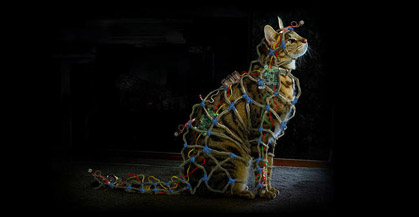Movie Review: The Darkest Hour
By Matthew Huntley
January 5, 2012
BoxOfficeProphets.com

In a nutshell, the movie is about a race of alien creatures who invade Earth so they can feed on its natural resources. The aliens initially appear as orange electric currents, like the glowing filament of a light bulb, and can be sensed whenever they pass anything that conducts electricity. Later on, we see they actually have gruesome faces, which are about as generic-looking as movie aliens get.
Trying to survive them, and eventually take them on, is a group of young adults in Moscow. Sean (Emile Hirsch) and Ben (Max Minghella) are a couple of Americans trying to sell their globetrotting software, which can be used to find all the best bars and nightclubs, to Russian advertising companies, but their idea is stolen by the devious Skyler (Joel Kinnaman). He’s one of those pale, skinny white guys whose goatee is incomplete in between his mustache and chin hair, which is often a dead giveaway for deviousness. Natalie (Olivia Thirlby) is another American traveling with her Australian friend, Anne (Rachael Taylor). They’ve been using Sean and Ben’s invention to find all the hot spots in the city and they all meet in a swanky club.
Suddenly, the power goes out and hundreds of orange glowy thingies start descending from the sky. A Russian police officer tries to make contact, but it vaporizes him and another cop’s bullets prove useless against them. Naturally, the whole city runs amok in fear and our five young people wait for days in a basement before they decide to seek help and figure out how to fight back.
During their journey across the city, they find out a few things: it’s best to travel at night (so they can detect the aliens via light bulbs); the aliens can’t sense humans through glass; two Russian survivors - an older man (Dato Bakhtadze) and a younger girl (Veronika Ozerova) - have taken shelter in an apartment surround by metal cages, which are impenetrable to the creatures; the old man has devised a microwave gun that stunts the aliens’ protective shields and makes them susceptible to traditional gunfire; a Russian nuclear submarine is leaving the city and will be able to provide refuge. If I’ve gotten any of this wrong, forgive me, but it shouldn’t matter too much, because if you make it this far into the movie, odds are your brain has already checked out and you’re just waiting it out like I did.
Essentially, The Darkest Hour possesses all the qualities of any typical bad movie. The dialogue is weak and laughable (“NDA - that stands for ‘Non-Douche bag Agreement,’ right?”); the characters are one-dimensional and the screenplay makes it all too easy for us to know which ones will die; the technical presentation is dreary and uninspiring (the shots at night look especially unconvincing, as if it was shot day for night, only poorly); the aliens are dull; and the movie is void of any tense or rousing moments that are supposed to get our heartbeats pumping, especially for an alien invasion picture. The movie is, by all definitions, flat and stupid, a studio throwaway that has no real value.
After seeing The Darkest Hour, the only thing I wondered was why it took place in Moscow of all cities. The characters make a point of saying the aliens invaded the entire planet. Not that the movie has to take place in any one city, but why didn’t the filmmakers utilize their location so it became a character in and of itself? The impression I got was that it was just cheaper to shoot in Moscow and that’s why it was chosen, not because it had any narrative significance. Sure, we get some major Moscow sites in wide shots, but the city has no personality. I guess I’m just asking the filmmakers to invest some thought and creativity into what they’re doing, but considering the other qualities of The Darkest Hour, that’s probably asking for too much.